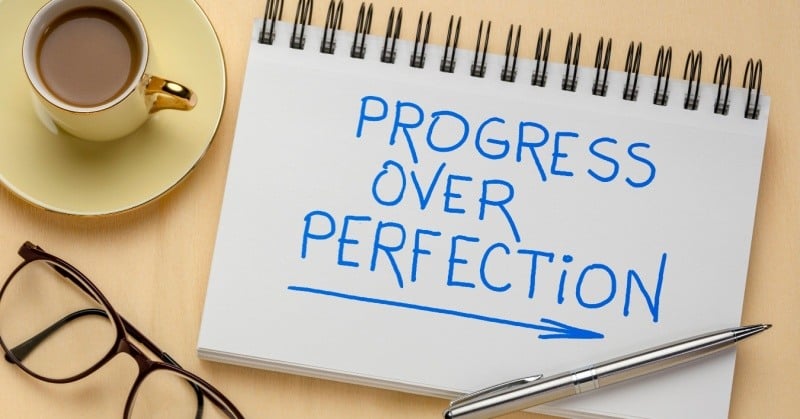Ladies and gentlemen, I ask you this question: Have you heard of the saying, “Perfect is the enemy of good?” It’s a phrase that I’ve heard often, but I never really appreciated its meaning until I had a chance to research the topic known as: The concept of “good enough.”
This idea of embracing “good enough” might seem counterintuitive. But I hope that once I share what I’ve learned with you, you will find the concept quite liberating!
I invite you to consider that while striving for excellence is something that we all should do, obsessing over “perfection” can become a significant obstacle to our success and fulfillment.
I will share with you three key considerations as to how embracing "good enough" can lead to greater achievement and personal satisfaction.
1. Why perfection is limiting
First, we need to understand why pursuing “perfection” is limiting. Folks, I hate to break it to you: there’s no such thing as “perfection.” Striving for an unrealistic standard can lead to unintended consequences.
When we set unrealistically high standards, we become paralyzed by the fear of making mistakes or falling short. This fear prevents us from taking risks, trying new things, and ultimately stifles our creativity.
Now don’t get me wrong—it speaks well of us to put out our best work. It becomes a problem when seeking “the best” gets in the way of deadlines or stalls our forward momentum when “good enough” is absolutely fine.
Think about it: Have you ever spent so much time trying to make something perfect that you ended up missing an opportunity? When we embrace "good enough," it liberates us from the chains of perfection and encourages us to focus on progress rather than flawlessness.
2. How perfectionism impacts our productivity
Second, we need to understand how perfectionism impacts our productivity. Seeking “perfection” often leads to an endless cycle of refining, tweaking and second-guessing our work. The issue is that when we fixate on every detail, we lose sight of the bigger picture.
I certainly understand this issue first-hand: I often struggle with writing—working on this speech is no exception. I’ve gotten better at recognizing my behaviors, but I still find myself nitpicking and tweaking my work well past the “ready” point.
There's also the law of diminishing returns to consider—a centuries-old principle which, in a nutshell, means that we end up wasting exponentially more time making seemingly minor changes to something that's already “good enough.”
Moreover, perfectionism can lead to procrastination. If we feel that our work isn’t up to an impossible standard, we delay starting or completing tasks altogether.
When we embrace "good enough," it empowers us to prioritize tasks effectively and allocate our resources wisely, allowing us to deliver high-quality work efficiently and consistently.
3. How perfectionism impacts our mindset
Third, we need to comprehend how perfectionism impacts our mindset.
Striving for perfection significantly shapes how we view ourselves and our accomplishments. When we constantly judge ourselves against an impossible standard, we undermine our self-esteem and well-being.
In her book, The Gifts of Imperfection, Brené Brown shares her perspective: “Understanding the difference between healthy striving and perfectionism is critical to laying down the shield and picking up your life. Research shows that perfectionism hampers success. In fact, it's often the path to depression, anxiety, addiction and life paralysis.”
When we embrace "good enough," we start to see failures and imperfections as opportunities for learning and growth. It encourages self-compassion and resilience, allowing us to bounce back from setbacks with a more positive and constructive attitude.
We learn to trust ourselves, recognizing that our efforts are valuable, even if they are not flawless. In turn, this helps us cultivate a more balanced and fulfilling life, where progress is prioritized over unattainable perfection.
Getting things done
We should consider the words of Sheryl Sandberg, former COO of Meta, the parent company of Facebook: "Done is better than perfect."
This quote resonates because embracing "good enough" is not about settling for mediocrity but about recognizing that perfection is often unattainable and counterproductive.
By understanding why perfection is limiting, how it impacts our productivity, and its effects on our mindset, we can begin the process of looking at the motivations behind our behavior and address those issues head-on.
Therefore, we would do well to strive for excellence without adding on the burden of perfection. And in doing so, we should all appreciate and enjoy the profound freedom and liberation that comes with being "good enough."
.png?width=150&height=63&name=TWRlogo-regmark_blueblack%20(1).png)
.png)










Do you have questions about this article? Email us and let us know > info@woodard.com
Comments: